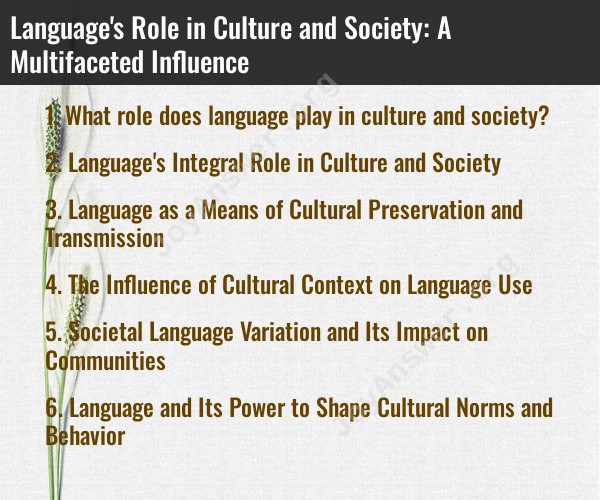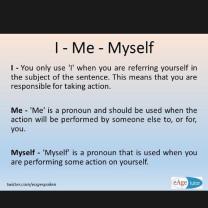What role does language play in culture and society?
Language plays a multifaceted and central role in shaping culture and society. It is a fundamental tool for communication, expression, and the transmission of knowledge and traditions. Here are some of the key roles that language plays in culture and society:
Communication: Language is the primary means by which individuals and groups communicate with each other. It allows people to convey their thoughts, feelings, needs, and ideas, fostering social interaction and understanding.
Identity and Belonging: Language is often closely tied to individual and group identity. It can be a marker of ethnicity, nationality, and cultural heritage. Language contributes to a sense of belonging and community.
Preservation of Tradition: Language is a medium for preserving and passing down cultural traditions, including stories, myths, rituals, and customs. It helps maintain a connection to the past and heritage.
Cultural Expression: Language enables cultural expression through literature, music, art, and storytelling. It serves as a creative outlet for expressing cultural values, beliefs, and experiences.
Socialization: Language is crucial for socialization, particularly in early childhood. It is through language that children learn about societal norms, values, and behaviors. It shapes their understanding of the world.
Influence on Thought: Language not only reflects thought but also influences it. Different languages may structure thought and perception in unique ways, affecting how people perceive and understand the world.
Power and Access: Language can be a source of power and privilege. Access to education, employment opportunities, and social mobility often depends on language proficiency. In some societies, certain languages are associated with higher status.
Globalization: In a globalized world, language plays a role in international communication and diplomacy. It facilitates trade, politics, and cultural exchange on a global scale.
Social Cohesion: A common language fosters social cohesion within a society. It helps people understand and relate to one another, reinforcing a sense of community.
Conflict and Division: Conversely, language can also be a source of division and conflict when linguistic differences are used to reinforce social, political, or ethnic divides. Language can be a tool for exclusion and discrimination.
Cultural Adaptation: In multicultural societies, language often serves as a bridge for individuals and groups to adapt to and participate in the dominant culture.
Scientific and Technical Advancement: Language is essential in the fields of science, technology, and academia. It allows for the dissemination of knowledge and the advancement of these fields.
Linguistic Diversity: The diversity of languages across the world contributes to the richness of global culture. Each language represents a unique way of viewing and understanding the world.
In summary, language is a dynamic and integral component of culture and society. It shapes how individuals and communities communicate, express their values and traditions, and interact with the world. Language both reflects and influences culture, and it is central to the human experience.
Language's Integral Role in Culture and Society
Language is an essential part of culture and society. It is the primary means by which we communicate with each other, share our thoughts and feelings, and build relationships. Language also plays a vital role in shaping our cultural identity and worldview.
Language as a Means of Cultural Preservation and Transmission
Language is a key vehicle for cultural preservation and transmission. Through language, we pass down our cultural traditions, values, and beliefs from one generation to the next. Language also allows us to connect with and learn from other cultures.
For example, the Inuit people of the Arctic have a rich oral tradition that includes stories, myths, and songs. These stories are passed down from generation to generation, helping to preserve the Inuit culture and identity.
The Influence of Cultural Context on Language Use
The cultural context in which we use language has a significant impact on how we communicate. For example, in some cultures, it is considered rude to make direct eye contact when speaking to someone older or of higher social status. In other cultures, direct eye contact is seen as a sign of respect and honesty.
Cultural context also influences the way we use body language and tone of voice. For example, in some cultures, it is considered rude to point at someone with your finger. In other cultures, pointing is a common way to get someone's attention.
Societal Language Variation and Its Impact on Communities
Language variation is a natural phenomenon that occurs in all societies. Language can vary depending on factors such as region, social class, age, and gender. For example, in the United States, there are significant differences in the way that people speak in different parts of the country.
Language variation can have a significant impact on communities. For example, people who speak a non-standard dialect of English may be discriminated against in the workplace or in educational settings.
Language and Its Power to Shape Cultural Norms and Behavior
Language has the power to shape cultural norms and behavior. For example, the way we talk about gender can reinforce gender stereotypes. For example, if we use the phrase "only girls play with dolls," we are sending the message that dolls are not for boys.
Language can also be used to promote social change. For example, the use of gender-neutral language has helped to raise awareness of gender equality.
Overall, language plays an essential role in culture and society. It is a powerful tool that can be used to preserve culture, transmit knowledge, build relationships, and shape social norms.
Here are some examples of how language is used to shape cultural norms and behavior:
- The use of honorifics. In many cultures, people use honorifics to show respect to their elders or superiors. For example, in Japan, people use the suffix "-san" after someone's name to show respect.
- The use of taboo language. In most cultures, there are certain words or phrases that are considered taboo. For example, in many cultures, it is considered taboo to curse in public.
- The use of euphemisms. Euphemisms are words or phrases that are used to replace more direct or offensive language. For example, instead of saying "he died," we might say "he passed away."
Language is a powerful tool that can be used to shape our culture and society. It is important to be aware of the ways in which language can be used to promote or reinforce cultural norms and behavior.












